
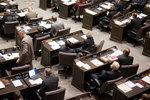
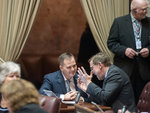

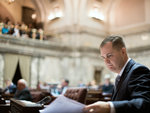
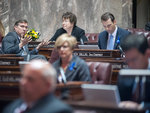
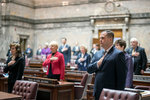

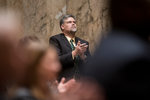
Ushering in the 2015 legislative session on Monday, Speaker of the House of Representatives Frank Chopp said, “equality and opportunity are not partisan words, they are American values.”
Although lawmakers face the difficult task of funding treatment for the mentally ill, education and transportation, among others, Chopp cited the state’s work at passing health care legislation as an example of government serving the needs of the people.
While other lawmakers share his optimism, their visions for the outcome of the year differ.
Finding a solution to flooding in the Chehalis River is a top priority for Rep. Richard DeBolt, R-Chehalis, this session.
“Looks like we’ll be able to have a bill that’s agreed to. We don’t care what body the bill moves out of,” DeBolt said. “There was some great work done by the Flood Authority. We want to be able to provide a mechanism that funds that. My job is to let the experts decide what’s best for salmon and water and to find that opportunity to fund the project and put together a flood bill.”
DeBolt’s bill will tie together water issues from across the state. He told The Chronicle in September he hopes to ask for $4 billion in projects to fund flood control projects in the Chehalis River Basin while at the same time funding a solution for Puget Sound stormwater runoff and irrigation issues east of the Cascades.
However, it’s unclear how his proposal will be funded. DeBolt said there are about 10 options being considered, ranging from cash bond purchases and stormwater fees.
“Right now we don't have the options hammered out to how to fund it,” he said.
With education spending being at the forefront of this legislative session, getting any landmark bills through congress is likely going to be difficult. But, DeBolt believes embracing flood control will allow the state to put more money toward schools.
“We’re spending, as a state, $400 million on flood damages and repairs,” he said. “If we go pass a proactive bill that repairs things and makes things to not flood in the future we can take the water projects out of the cap budget and free up about $400 million for school construction.”
The state is on the hook for an addition $7.7 billion dollars over the next five years to fund education. For several years lawmakers have said a transportation bill is necessary for projects around the state, but they’ve struggled to pass legislation.
Many Democrats and Gov. Jay Inslee are calling for new revenue sources which includes potentially raising the gas tax, but DeBolt, and many other Republicans aren’t convinced they are necessary.
“With the price of gas going down the gas tax revenue should be going up, for the government to want more taxes doesn’t seem logical to me,” he said.
However, Takko said not raising taxes somewhere is idealistic, and said that new revenue isn’t enough to cover all the state’s obligations.
“State employees in the last eight or 10 years down close to 1,000 and yet the population is up about 1 million at the same time,” said, Rep. Dean Takko, D-Longview. “We just don’t have $3 billion of brand new money to spread out and solve (education).”
In light of all the funding issues, Takko said passing any big legislation is going to be very difficult. That’s evidenced by what he said is a significant drop in pre-filed legislation compared to other sessions. He said he is focused on addressing issues that affect local government.
“Most of my bills are not very sexy … It’s almost a defensive year rather than an offensive year,” he said. “No one is throwing out grandiose ideas, because I think they know those ideas cost money.”
While it’s common in bars and breweries across the state to give customers a sample of beer before they buy it, it’s illegal though almost never enforced. Takko said he’ll draft legislation to legalize the practice outright.
“I’d like to make legal what everyone does already,” he said.
He is also focused on allowing people with failed septic systems to repair them, if hooking up to municipal water supplies is too expensive. He also wants to see long life batteries in carbon-monoxide testers, money to repair reservoirs in Kelso and equalizing flood control district commissioner per diem rates to those of other small district commissioners.
Although he’s not on any related bills, one of the highest issues on his list is bringing the recreational and medical marijuana industries together. He said the state currently has a three tiered system between legal, medical and illegal marijuana that just “isn’t working.”
He said that while Attorney General Bob Ferguson’s opinion that municipalities can ban legalized marijuana might be the correct legal analysis, it doesn’t stop the Legislature from drafting laws to guarantee legal access across the state. He also said local governments deserve a cut of the revenue.
“We have to get some of that money back to the locals,” he said. “But, if you don't have retail marijuana why should you get a slice of the pie?”